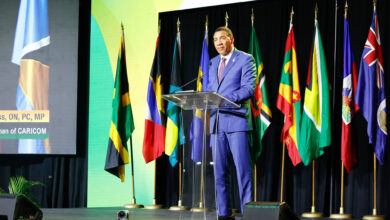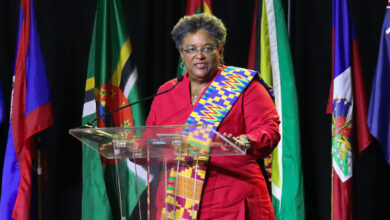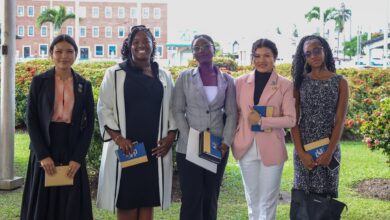Professor Edward Greene, Chancellor, University of Guyana;
Professor Paloma Mohamed Martin, Vice-Chancellor, University of Guyana;
Dr. Mellissa Ifill, Deputy Vice-Chancellor, Institutional Advancement, University of Guyana and Chair of this evening’s proceedings;
Fellow presenters:
o Professor Alissa Trotz, University of Toronto;
o Dr. Venkat Iyer, Editor, The Round Table Journal;
o Professor Tavis Jules, Guest Editor, The Round Table Journal;
Other Members of Staff and Students of the University of Guyana;
Distinguished Guests;
Ladies and Gentlemen.
I am pleased to join you this evening for the launch of the Special Issue of the Roundtable Journal on CARICOM @ 50 and thank the organisers for the gracious invitation to this event.
Congratulations on the publication of this Journal, which will serve as a valuable resource for generations to come. I always encourage independent research and publication on CARICOM, and on issues related to the work of CARICOM. When I was a young undergraduate student, I had the privilege of reading the works of eminent scholars of regional integration, economic development and underdevelopment, and engaging in many intellectual debates on the future of the CARICOM Region and the countries that comprise our Community. In those days, we had many researchers both within the regional universities and at universities abroad doing deep analysis of our colonial and post-colonial realities, and the development challenges that we face.
Many of those scholars have passed on, and it appears that the amount of independent research and discussion on things CARICOM has declined significantly. It is a reality that we, who are involved in building integration and all of us who care about the outcomes, need to face. We need to reverse the decline in independent research if the intellectual underpinnings of the regional integration process is to be strong, supportive and welcoming of the deep debate that is necessary for good decision-making and broad support for the process. This evening when I heard Vice Chancellor Paloma Mohamed talk about the publications being regenerated by the University, it gave me hope that in fact, we are going to be seeing even more research, debates and publications that can inform the kinds of conversations that should attend to the regional integration process that we are engaged in.
The golden jubilee of the Caribbean Community (CARICOM), in 2023, coincided with the Sixtieth Anniversary of the University of Guyana, so congratulations are due to the University. Like CARICOM, the University would have taken the time during the anniversary activities to reflect on its accomplishments and its trajectory. At CARICOM, we took the opportunity to reflect on achievements so far, as a basis to build on lessons learned as we seek to move forward with building an integration process that benefits all our peoples.
Ladies and Gentlemen,
The Caribbean Community has, as its organising principle, the need, desire and logic of our Member States combining their human, economic and natural resources to find common solutions to development challenges, so as to accelerate development and create a viable and prosperous Region. The objective is to build a sustainable Community with an acceptable quality of life, with people at the centre of our development policies, strategies and initiatives strengthening the national development of individual Member States.
When the West Indies Federation of 1958 failed, whether it was because it was a colonial imposition or it was caused by internal disagreements or both, this Region moved on. The Caribbean Free Trade Area (CARIFTA) was born in 1965. It grew into the Community and Common Market which was established by the Treaty of Chaguaramas in 1973 and into the Caribbean Community, including the Single Market with the Revised Treaty of Chaguaramas in 2001.
At its core, CARICOM is a collaborative and coordination mechanism with a number of specialised Regional Institutions, some of which even predate the establishment of CARICOM. These institutions include the Caribbean Court of Justice, the Caribbean Disaster Emergency Management Agency, the Caribbean Catastrophe Risk Insurance Facility, the Caribbean Examinations Council, the Caribbean Regional Fisheries Mechanism, the Caribbean Community Climate Change Centre, the Caribbean Agricultural Research and Development Institute and the Caribbean Public Health Agency. These Regional Institutions function to advance and enhance the benefits of our integration in areas, including Education, Health, Agriculture and Fisheries, Disaster Management and Response, Climate Change, Crime and Security, Information and Communications, and Energy.
We have raised our voices as CARICOM in the international arena and undertaken sustained advocacy on fundamental principles of global importance. From the fight to eradicate apartheid in South Africa many years ago to the current struggle for survival of the Palestinian people.
In the ongoing discussions/negotiations on climate change, we advocate for fairness in addressing the sources of the emissions that are central to global warming in a context in which countries like ours bear an inordinate impact of climate change, when together we contribute negligibly to global emissions.
For us in the Caribbean, climate change is neither an esoteric, academic discussion nor an oncoming impact to be expected. We are already experiencing the impact of climate change in loss in agriculture production and productivity; increased cost of replacing housing, public infrastructure such as roads, bridges and buildings; and the cost of raising building standards to withstand the annual cycle of storms that are both stronger and more frequent. Droughts are longer and deeper. Fresh water supplies are receding and the list goes on.
Last year’s COP28 was widely regarded as a historic event, with the completion of the first Global Stocktake (GST) on progress towards achievement of the Paris Agreement goals. However, CARICOM is gravely concerned that the Global Stocktake confirmed that emissions of greenhouse gases continue to rise, and the Nationally Determined Contributions (NDCs) of Parties will not keep global temperature rise below the 1.5oC goal enshrined in the Paris Agreement. Even if we in CARICOM do everything we can do to stop global warming, as we are often required to demonstrate that we are doing in order to access climate financing, the impact is arguably immaterial if the major emitters do not successfully reduce their emissions. Essentially, we are being forced to do the little that we can do, which will have little impact, and the major emitters are not doing enough.
This is why we constantly advocate for affordable access to financing for adaptation and mitigation. This is why we support the Bridgetown Initiative, advanced by the Honourable Mia Amor Mottley, Prime Minister of Barbados, which argues for policy and structural reforms to the international financial architecture to recognise the need to correct the inequity meted out to small vulnerable states, given the current structures and processes.
Our Member State, Antigua and Barbuda, will host the United Nations Fourth International Conference on Small Island Developing States (SIDS4) from May 27-30 this year. We hope that this Conference will spur greater awareness of the unique plight of SIDS and will result in an inter-governmentally agreed political outcome document which is focused, forward-looking and most importantly, actionable.
Within our Community, we support each other even where our resources may be constrained. CARICOM’s support of our sister Member State, Haiti, as it grapples with the ongoing severe multi-dimensional crisis, continues. Over the last year, when it became clear that many others in the international community had lost credibility with the Haitian people, CARICOM remained engaged, supporting a process of internal consensus building, even where there were many who questioned capacity, motivation and likely success of the effort. That support will continue as the Haitian people work towards stabilisation and credible elections to ensure that a government chosen by the people emerges from the recently established transitional arrangements.
In addition to the priority attention being paid to the crises in Haiti, CARICOM is also focusing on accelerating our food and nutrition security agenda. In 2018, the Community had agreed a regional target to reduce our food import bill by 25% by the year 2025. Shipping and logistics disruptions during the COVID pandemic and re-enforced by ongoing conflicts around the world, has given new impetus to this goal. Member States are implementing an agri-food systems agenda to reduce reliance on extra-regional imports of food; enhance production and trade of regional agricultural products; involve women and youth in agriculture; integrate smart agriculture technologies and provide greater access to a supply of fresh nutritious foods. This effort is being led by Guyana through His Excellency Mohamed Irfaan Ali, President of the Cooperative Republic of Guyana and current Chair of the Conference of Heads of Government. He has responsibility for agriculture in the CARICOM Quasi-Cabinet. Production of key food and other products is increasing and any remaining non-tariff barriers to intra-regional trade are being finally removed.
However, agri-food investment will not only enhance food and nutrition security, but also serve as an engine for broader economic growth, prosperity and stability of the Region. But to make this happen, we also need to address the provision of reliable transportation. This is the piece of the integration puzzle that has eluded us for many years, and without which the 25 by 2025 ideal becomes extremely difficult to achieve. Efficient and cost-effective air and maritime transportation of both people and goods is one of the fundamental drivers of integration. This requires substantial investment. Our Community has been working on several fronts to achieve that goal, whether through public-private partnerships or through international cooperation mechanisms.
A recent development is the steps taken by the Governments of Guyana, Trinidad and Tobago, and Barbados to launch a ferry service which is intended to facilitate the movement of people and goods, especially agricultural produce.
Studies have shown that resolving the transportation challenge could boost intra-regional trade by at least 200%. Affordable travel would allow for greater co-mingling of our people, thereby strengthening the feeling of belonging to a Community.
There are other areas of functional cooperation that are also engaging CARICOM’s attention, such as transition to renewable energy generation, and acceleration of digital development and transformation. In these efforts, it is the ability of our human resources, not only to master the operation, but also to use it to create value that will benefit our Region. More than 60% of the population of the Caribbean Community is under 30 years old. This is the entrée for our Region’s institutions of higher learning, such as the University of Guyana and other universities, to help to prepare our young people to channel their facility with the technology, their creativity and their innovative skills.
Ladies and Gentlemen,
There is no denying that there is room for much more to be done to realise the fundamental ideals set out in the Revised Treaty of Chaguaramas. We recognise that our challenges are not insurmountable, as thorny as they may seem. I am pleased to acknowledge the strengthening of collaboration among our Member States and our Regional Institutions in addressing issues together as we move forward. The decisions taken so far to strengthen governance arrangements, including by ensuring that the voices of the private sector, labour, civil society, and especially young people are heard, will continue to be implemented.
Going forward, we will be seeking greater involvement of our universities, research bodies, and experts resident in the Region and in the diaspora, in providing a broader range of advice and perspectives.
CARICOM has enjoyed five decades of incremental success. A lot of our achievements are taken for granted, and some are not even associated with the integration movement. Notably, even as the Community has been strengthened by its Members and Associate Members, there has been an increase in the number of countries within and outside of the Caribbean which are seeking closer association with CARICOM, and discussions on new Members and Associate Members are ongoing.
Ladies and Gentlemen
As the theme for our 50th Anniversary celebrations notes, earlier generations laid a solid foundation. It is now the turn of this generation not only to secure and improve on those gains, but to use the creativity, ingenuity and dynamism that characterise Caribbean people to reimagine the next 50 years of CARICOM – to complete those things that we have not yet accomplished and set out and continue to expand our horizons.
Thank you very much, ladies and gentlemen.






